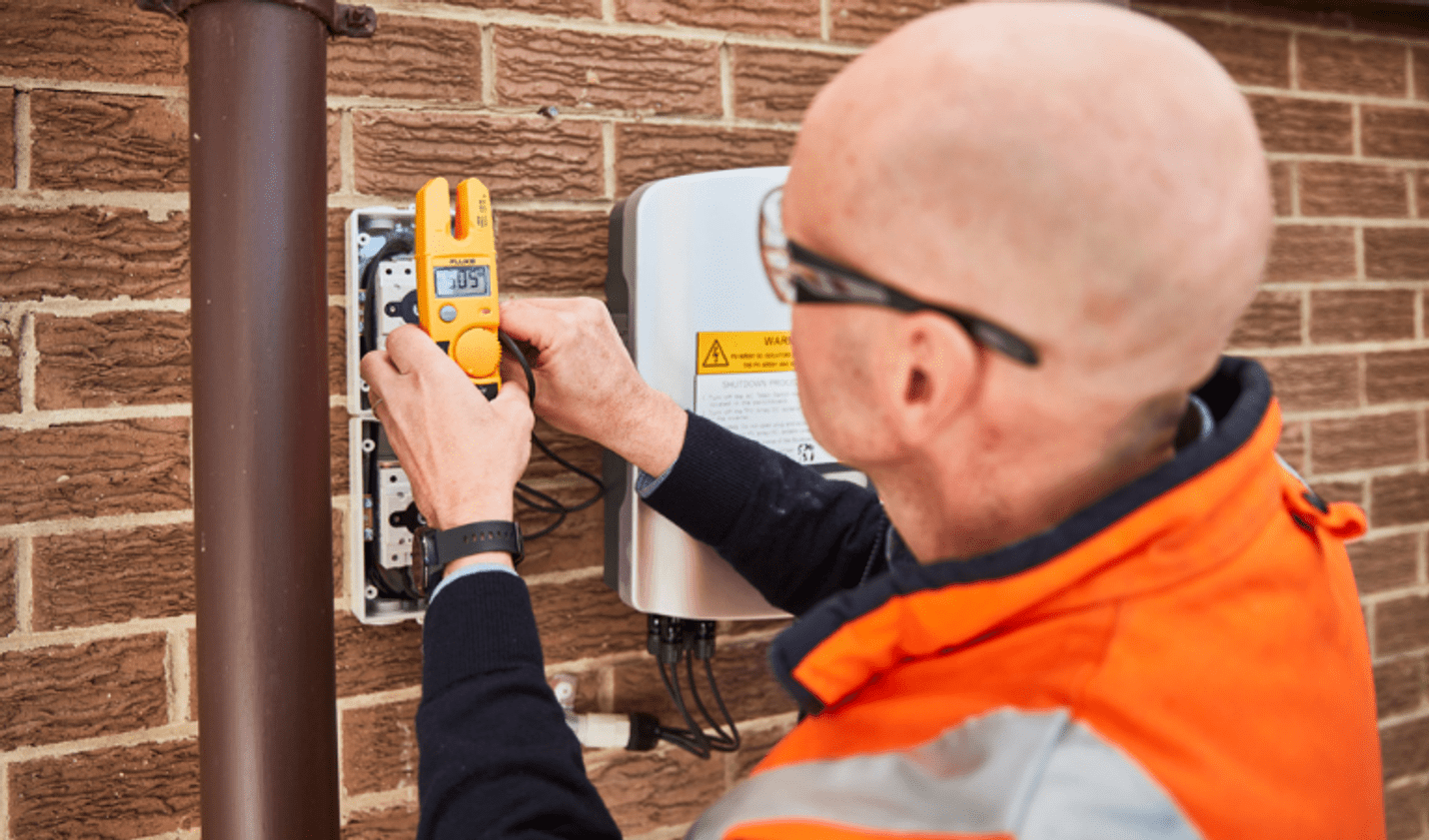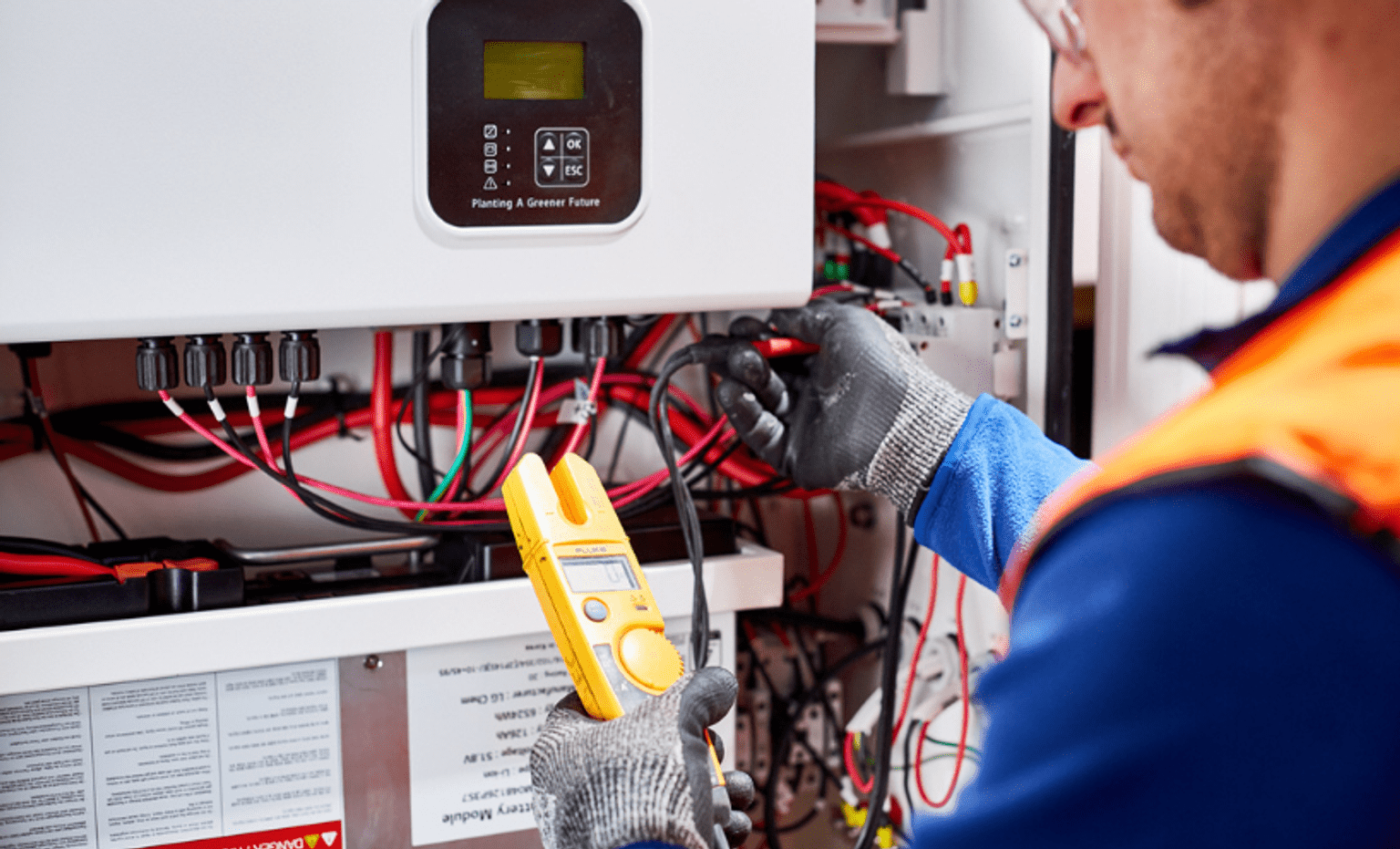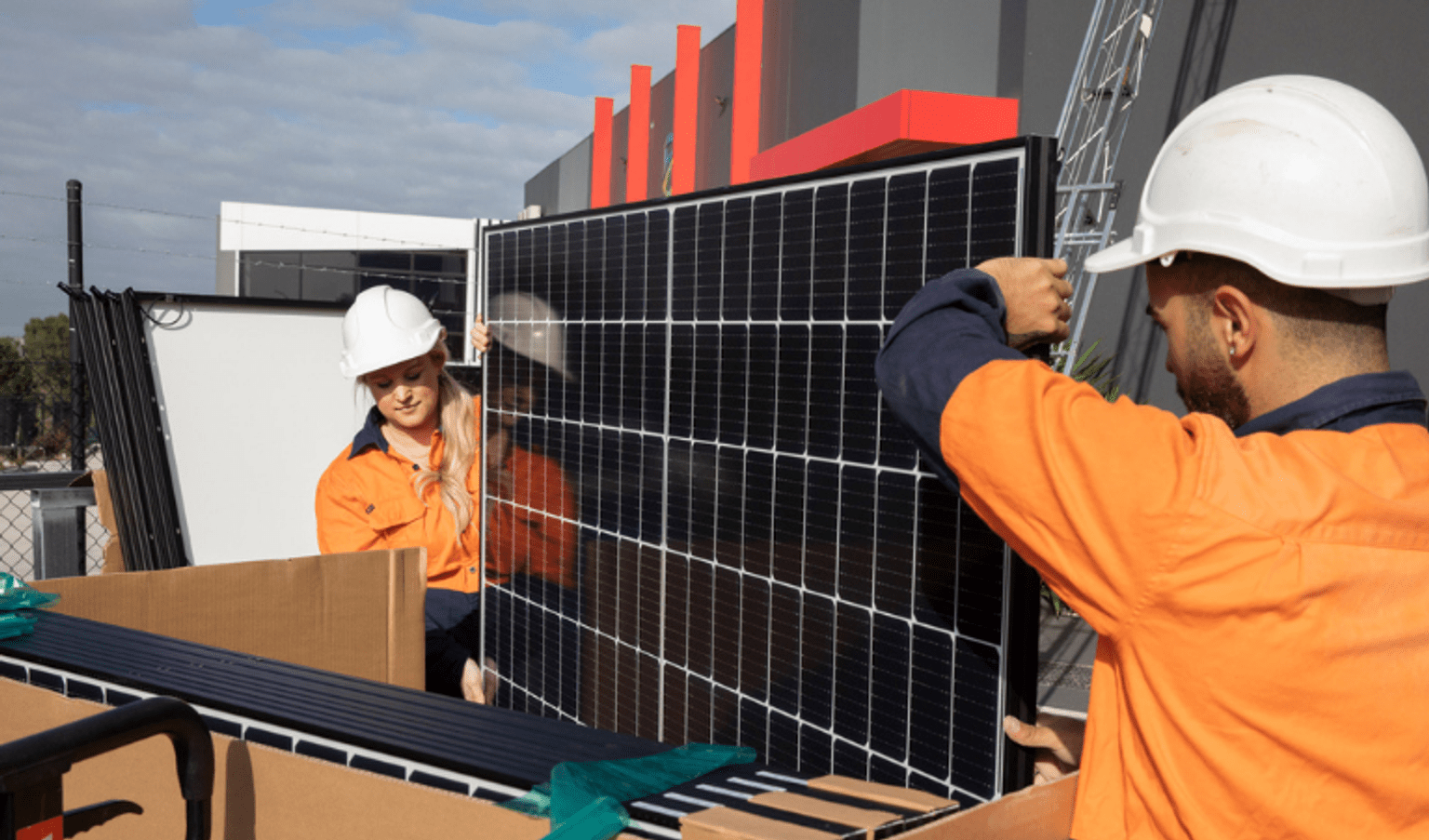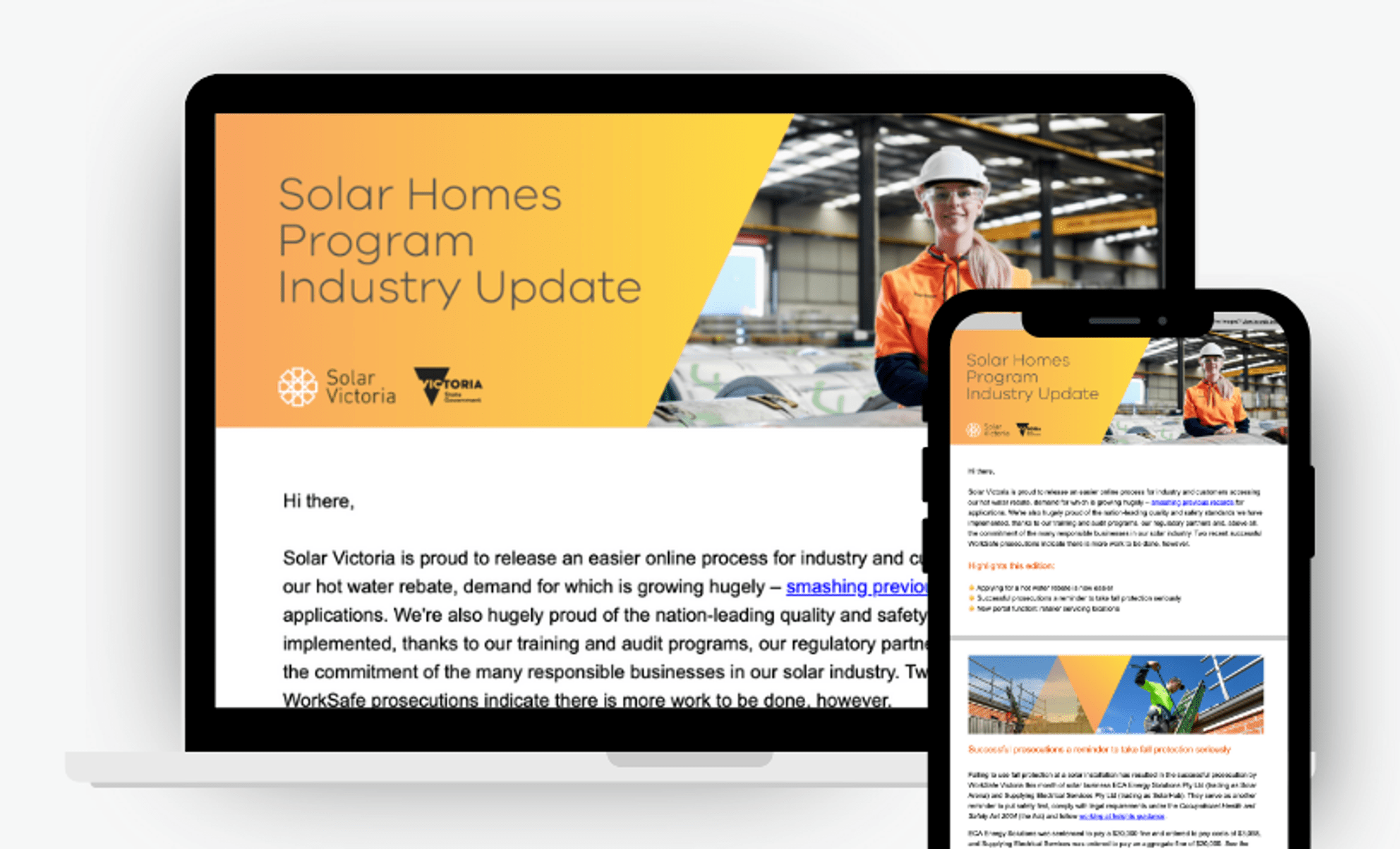We work closely with regulators, peak bodies and industry to ensure safety and quality standards are maintained across the Solar Homes Program.
Authorised retailers and installers in the Solar Homes Program are required to meet relevant safety and quality standards and comply with all applicable laws, regulations and standards.
The resources and information on this page are not exhaustive and do not replace the obligations of authorised retailers and installers to understand and comply with all compliance obligations, standards and requirements.
WorkSafe Victoria
Website: worksafe.vic.gov.au
WorkSafe Victoria is Victoria’s occupational health and safety regulator. Its role is to prevent workplace injuries, illness and fatalities, and to enforce Victoria’s occupational health and safety legislation.
As an employer, you are required to provide and maintain a working environment for your employees that is safe and without risks to health.
This includes inducting employees into a well-developed safety management plan. You also need to develop and follow a safe work method statement (SWMS) to undertake high-risk construction work. High-risk construction work is:
- where a person has a risk of falling more than two metres
- on or near energised electrical installations or services.
Useful resources and information:
Working from heights:
- Compliance code: Prevention of falls in general construction
- Compliance code: Prevention of falls in housing construction
- A guide to falls prevention
- Safe work method statements (SWMS)
- The hierarchy of control
Also see the series of technical solution sheets we developed with WorkSafe Victoria on working safely at height and:
- Working safely with asbestos
- Preventing electric shocks to electricians
- Occupational violence and aggression: Safety basics
- Working alone information sheet
- Controlling OHS hazards and risks: A handbook for workplaces
- Skin cancer and outdoor work: A guide for employers
Energy Safe Victoria
Website: energysafe.vic.gov.au
Energy Safe Victoria is the state energy safety regulator for gas, electricity and pipelines in Victoria. Its role includes ensuring electrical workers isolate, take appropriate measures and work safely when installing electrical equipment and electrical installations.
Authorised retailers must ensure that only employees who are licensed electrical installation workers carry out electrical installation work. Installing and maintaining the following is electrical installation work, which must be carried out by licensed electrical workers:
- PV systems
- electrical equipment, including grid and stand-alone power systems
- associated wiring systems that operate, or are intended to operate, at a voltage greater than extra low voltage (ELV) – not exceeding 50Va.c. or 120V ripple-free d.c.
A person who is not a licensed electrical installation worker is only authorised to locate, mount or fix in place individual items of ELV electrical equipment.
They cannot make or terminate electrical connections to individual items of ELV electrical equipment or install supply conductors that will connect the equipment to an electricity supply greater than ELV.
Useful resources and information:
See solar installations for:
- Working safely when installing photovoltaic (PV) systems
- Ensuring a compliant PV installation
- Identifying mismatched d.c. connectors in PV installations
- Solar for Apartments industry guidance
- Clean Energy Council advice on repairs and alterations
- Grid connected inverter requirements from 18 December 2021
Also see:
- Your responsibilities as a licensed electrician
- Requirements for the effective supervision of apprentice electricians
- Certificates of Electrical Safety
- Never work live campaign
- Show your solar some love campaign
Building and Plumbing Commission
Website: bpc.vic.gov.au
The Building and Plumbing Commission (BPC) regulates Victoria's plumbing practitioners and plumbing work.
The BPC uses a range of regulatory tools to prevent and react to non-compliance. This includes an audit program to identify levels of non-compliance, a complaints and enforcement team that monitor compliance and investigate complaints and regular occurrences of non-compliance.
It also publishes resources to inform practitioners and the community about relevant building and plumbing related legislation and standards for general guidance in respect to building or plumbing practice.
Useful resources and information:
These key documents form the plumbing regulatory framework in Victoria:
- Building Act 1993
- Plumbing Regulations 2018
- National Construction Code, Volume 3 (Plumbing Code of Australia, PCA)
See Heat pump installations for technical installation guidance on:
- protecting water from freezing
- support of water heaters or water storage tanks installed other than in a roof space or above a roof
- requirements for the installation of temperature control devices, and pipework heat retention associated with storage heated water systems
- piping associated with storage water heaters.
See Plumbing Practice Notes – Solar water heaters for guidance on applying the solar water heater option to meet Victorian energy efficiency variation to the National Construction Code 2019 and associated standards in the Plumbing Regulations 2018.
Clean Energy Council
Website: cleanenergycouncil.org.au
The Clean Energy Council (CEC) is a peak body for the clean energy sector in Australia.
To participate in the Solar Homes Program and maintain standards across the industry, all solar panel (PV) and battery retailers must be New Energy Tech Approved Sellers under the New Energy Tech Consumer Code administered by the CEC.
We may refer potential breaches of the New Energy Tech Consumer Code to the CEC. These referrals can follow from the performance reporting stage of audits.
Energy and Water Ombudsman Victoria
Website: ewov.com.au
The Energy and Water Ombudsman (EWOV) is a dispute resolution service for energy and water issues. EWOV receives complaints about energy and water related matters within its jurisdiction.
Essential Services Commission
Website: esc.vic.gov.au
The Essential Services Commission (ESC) is Victoria’s regulator for the price, quality and reliability of essential services, and sets the minimum feed-in tariffs that energy companies pay to consumers for power they export to the grid (via sources including solar panels).
The ESC provides information for consumers in relation to electricity, gas and water issues as well as energy saving information.
Clean Energy Regulator
Website: cleanenergyregulator.gov.au
The Clean Energy Retailer (CER) is an Australian independent statutory authority responsible for administering legislation to reduce carbon emissions and increase the use of clean energy.
The CER also oversees installer accreditation and product approval arrangements under the Renewable Energy (Electricity) Regulations 2001 for the operation of its Small-scale Renewable Energy Scheme. Solar PV system installers and designers must be accredited by the CER’s accreditation scheme operator to be eligible to participate in the Solar Homes Program. See Become an authorised solar retailer or installer.
We may also refer instances of non-compliance by installers accredited as part of the SRES.
Consumer Affairs Victoria
Website: consumer.vic.gov.au
Consumers of solar can also seek protection from practices like inaccurate marketing and high-pressure tactics.
We are working with a range of regulators, government agencies and peak bodies to ensure industry is protecting consumers.
Updated




